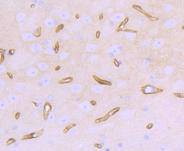Product Detail
Product NameDystrophin Rabbit mAb
Clone No.JF1-022
Host SpeciesRecombinant Rabbit
Clonality Monoclonal
PurificationProA affinity purified
ApplicationsWB, IHC
Species ReactivityHu, Ms, Rt
Immunogen Descrecombinant protein
ConjugateUnconjugated
Other NamesBMD antibody CMD3B antibody DMD antibody DMD_HUMAN antibody Duchenne muscular dystrophy protein antibody Dystrophin antibody Muscular dystrophy Duchenne and Becker types antibody
Accession NoSwiss-Prot#:P11532
Uniprot
P11532
Gene ID
1756;
Calculated MW427 kDa
Formulation1*TBS (pH7.4), 1%BSA, 40%Glycerol. Preservative: 0.05% Sodium Azide.
StorageStore at -20˚C
Application Details
WB: 1:1,000
IHC: 1:50-1:200
Immunohistochemical analysis of paraffin-embedded mouse skeletal muscle tissue using anti-Dystrophin antibody. Counter stained with hematoxylin.
Immunohistochemical analysis of paraffin-embedded mouse brain tissue using anti-Dystrophin antibody. Counter stained with hematoxylin.
Dystrophin-glycoprotein complex (DGC) connects the F-Actin cytoskeleton on the inner surface of muscle fibers to the surrounding extracellular matrix, through the cell membrane interface. A deficiency in this protein contributes to Duchenne (DMD) and Becker (BMD) muscular dystrophies. The human dystrophin gene measures 2.4 megabases, has more than 80 exons, produces a 14 kb mRNA and contains at least eight independent tissue-specific promoters and two poly A sites. The dystrophin mRNA can undergo differential splicing and produce a range of transcripts that encode a large set of proteins. Dystrophin represents approximately 0.002% of total striated muscle protein and localizes to triadic junctions in skeletal muscle, where it is thought to influence calcium ion homeostasis and force transmission.
If you have published an article using product 49412, please notify us so that we can cite your literature.




 Yes
Yes



